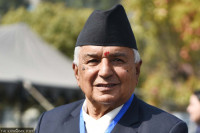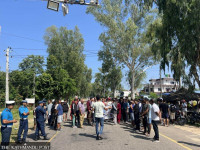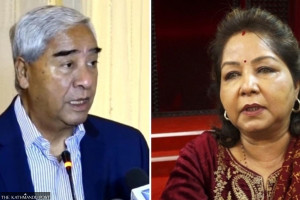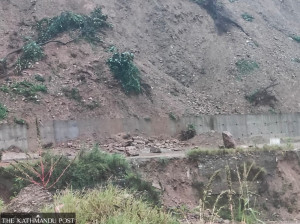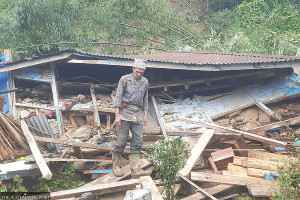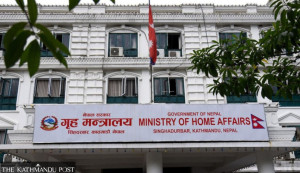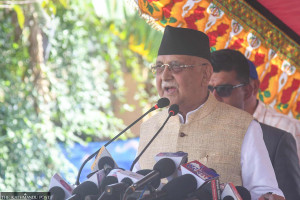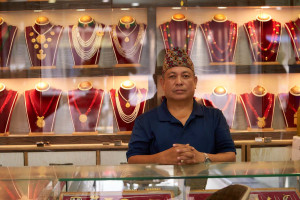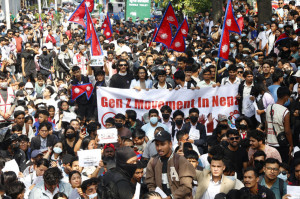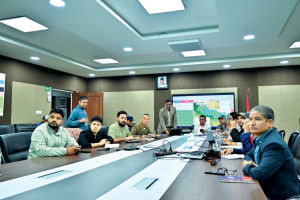National
Sudan Gurung’s bold presentation on disaster response: A citizen’s input or overreach?
A major point of contention has been the tone and language used by Gurung, which some reckon were ‘condescending’.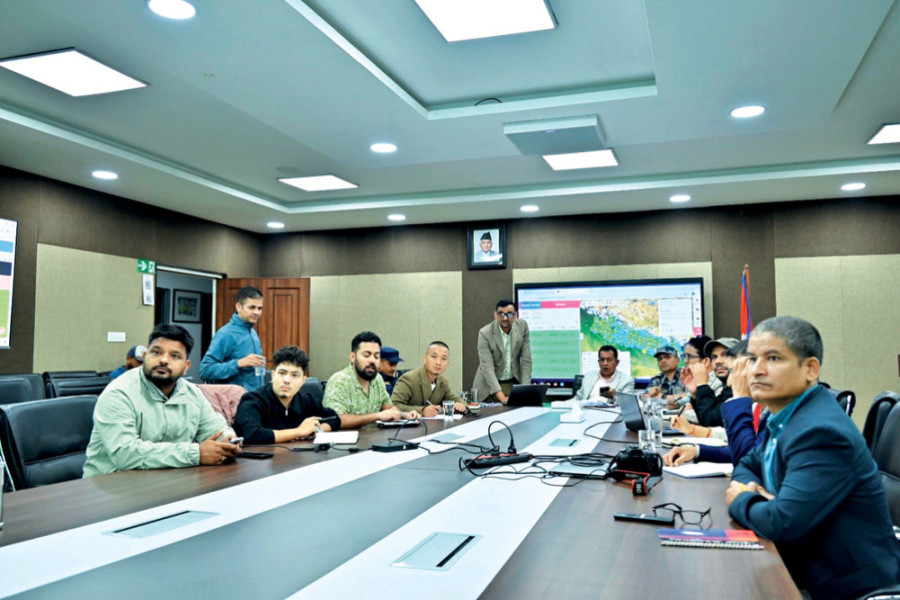
Aarati Ray
The festive spirit seen on the day of Vijaya Dashami on Thursday was quickly washed away by heavy rains and warnings of floods and landslides. Heavy rains swept across the country starting Saturday, drenching homes and hearts alike with fear of floods and landslides.
Although the downpour has eased a little, forecasts indicate that the rain will persist until Monday. Over the past two days, social media has mirrored the nation’s anxiety, timelines overflowing with updates, alerts, and optimism about the government’s preparedness this time.
However, since Saturday evening, a video of Hami Nepal founder Sudan Gurung speaking at a meeting of the National Disaster Risk Reduction and Management Authority (NDRRMA) has gone viral. From Facebook and Instagram to Twitter, the majority of online discussion now centres on Gurung’s presence at the meeting, far more than the actual work of disaster management or the ongoing rains.
By Sunday evening, the conversation had sharply divided people. Many questioned Gurung’s qualifications to attend, mocking him and Hami Nepal with comments like “an NGO is running the government”. Others defended him, dismissing the criticism as a reflection of an outdated mindset.
Critics of Sudan Gurung
Posts flooded platforms claiming that the government had become a ‘puppet of external forces and NGOs’, with many ridiculing Gurung’s competence for allegedly giving ‘instructions’ during the meeting.
For instance, one Twitter user, Mahesh Mal, with over 2,000 followers, questioned Gurung’s loyalties: “For whom is Sudan Gurung working?... was the real sacrifice of Gen Z brothers and sisters for this?”
Another user, Bishwar Rai, who has more than 40,000 followers, wrote, “People are asking what Sudan Gurung’s position really is: the Prime Minister, he created; the Home Minister, he created; the ministers, he selected….When the state’s operational system fails, these kinds of scenes are visible.”
Adding to the critique, another user, Bimal Pokhrel, posted: “Both Sushila Karki and Sudan Gurung are foreign ‘puppets’...This is the essence of your so-called change. You all deserve exactly this.”
At the same time, there has also been support for Gurung’s participation, with many defending his presence by questioning why civil society stakeholders with years of experience in disaster management cannot offer suggestions to the government during a crisis or engage in constructive discussions.
Gurung’s backers have pointed out that those mocking this simple act of a citizen providing input to the government may reflect the resistance of entrenched political interests or a conservative mindset. This, they say, ignores the importance of collaboration between the public, government, and non-governmental bodies.
For instance, Aastha Dahal, an advocate, wrote on Facebook that the criticism targeting Gurung reflects the older generation’s “obsession with subservience and formality,” noting, “The round table is full of government representatives; they aren’t bound to obey Sudan. They are listening to expert advice. This, however, is a problem for some, because how dare the ‘ruled’ sit together and direct the ‘rulers’.”
“A problem has been seen among the Bahun-Chhetris,” wrote another user, Anjali Subedi. “They have long practised cleverness, shrewdness, hypocrisy-led protocol, hierarchy over everything”.
Subedi, also an Asian Journalism Fellow 2021, continues, “ That’s why their eyes first look for exactly that! The heart to feel the purity, roughness, straightforwardness, and even expertise seen in other communities is largely absent in them [Bahun-Chhetris]...only a few exceptions.”
A major point of contention in online discussions has been the tone and language used by Gurung, which some reckon were ‘condescending’, giving the impression that he was instructing the government.
However, Gurung himself, along with Dinesh Prasad Bhatta, chief of NDRRMA, as well as Home Minister Om Prakash Aryal, have challenged this narrative, clarifying that Gurung was only giving his suggestions—not instructing government officials.
How did Gurung take part in the meeting?
According to Gurung, they reached out to the home minister via a call on Friday about the disaster preparedness and Hami Nepal’s readiness to help. They suggested that this time, the government should not repeat the mistakes of previous governments, where, instead of taking preventive measures, action comes only after disaster strikes.
After Aryal reportedly agreed, they attended an informal meeting on Saturday. “Perhaps the way I expressed myself might not have been linguistically perfect, but the intention was good—to share our experience from 10 years of ground-level work and offer suggestions.”
He refuted media claims suggesting that he had been issuing directives or instructions to the government. “That narrative is completely wrong and has been twisted,” he said.
Bhatta, the chief executive of the NDRRMA, clarified, “Most importantly, it was not a formal meeting; it was an informal discussion.”
According to Bhatta, in the discussion, Gurung shared his experience and also offered Hami Nepal’s support, stating that they were ready to help if needed, with available volunteers and heavy-duty drones capable of delivering relief and rescue supplies to areas inaccessible even by helicopters.
Gurung says while their presence might have drawn more attention following the Gen Z protests, their involvement in disaster response is not new. “NDRRMA has recognised us for our past contributions in disaster and relief work,” he said.
Gurung’s Hami Nepal is a registered non-profit organisation active in the field of disaster management and relief support since the 2015 earthquakes.
Listing examples, Gurung pointed out their involvement in relief and response efforts during the Covid pandemic, the Jajarkot earthquake, the Roshi Khola disaster, and even international relief campaigns. “We coordinated with the NDRRMA even during the [2023] Turkey earthquake, when we had launched a campaign for relief collection,” he said.
Home Minister Aryal, in a phone interview with Kantipur, the sister publication of the Post, said, “He was not giving instructions. It’s just that in times of crisis, the government will embrace and accept suggestions from those who have more expertise and experience on the situation.”
“His organisation has been working in this field for around a decade. He was still on the ground yesterday, working, while we had already gone to sleep,” added Aryal.
As per Aryal, people who work directly in the field are generally action-oriented. Their tone or manner of speaking may sometimes be misinterpreted. “Whatever he said, he said confidently; that’s his style, not an attempt to give instructions. I believe the NDRRMA has not taken it otherwise.”
According to Gurung, the Hami Nepal team was at the NDRRMA until 3 am. The team coordinated rescue requests through their various communication channels to the government, ensuring people were brought to safety. He credited the government’s prompt response with saving many lives.
Many mocking Hami Nepal’s engagement in the meeting, Gurung suggested, are loyalists of established political parties who prefer maintaining hierarchical structures where the government remains untouchable.
Gurung stressed that dismissive attitudes towards citizen participation run counter to democratic principles. “The government and the people should work closely together. The government is a body of the people, for the people, and citizens have every right to question, suggest, and participate,” he said.
He noted that in the past, efforts to engage with authorities were often ignored or suppressed. Today, however, he sees a positive shift, with more space for citizens to share suggestions and express opinions, “a sign of growing civic collaboration and openness to accountability,” Gurung added.




 14.63°C Kathmandu
14.63°C Kathmandu




